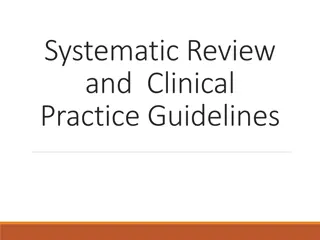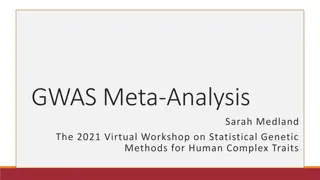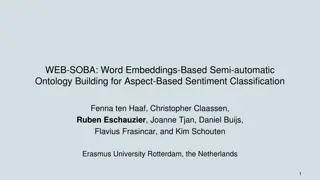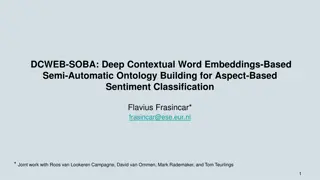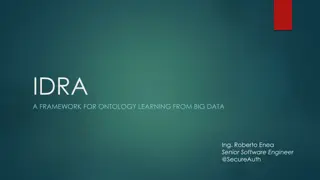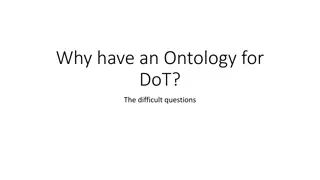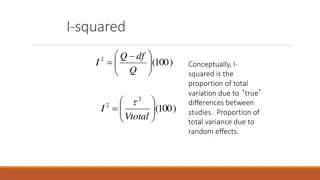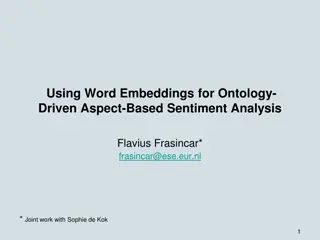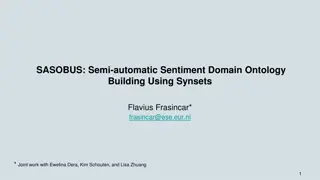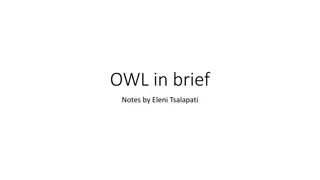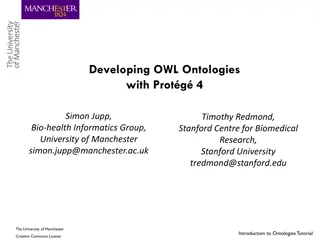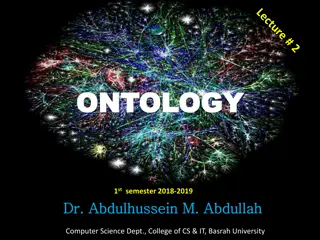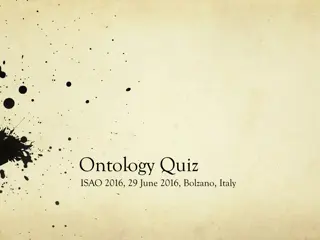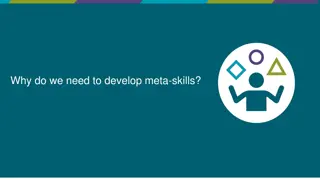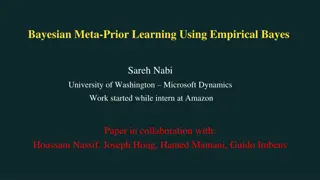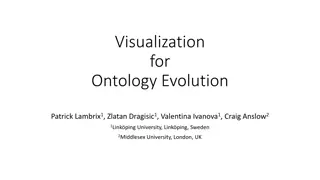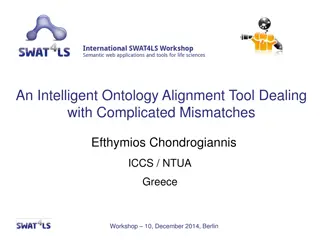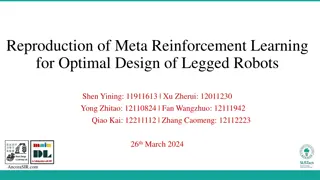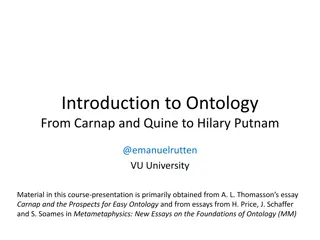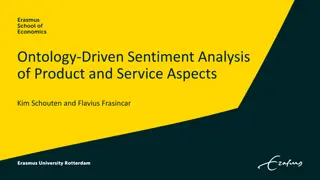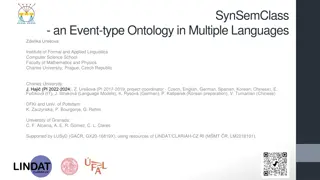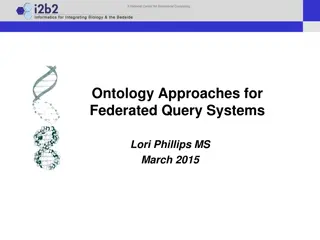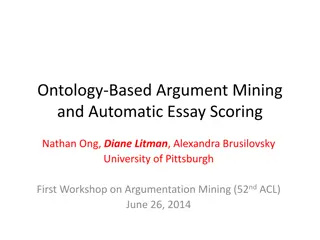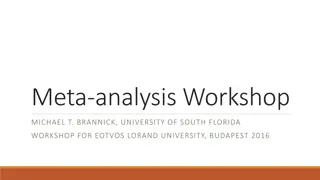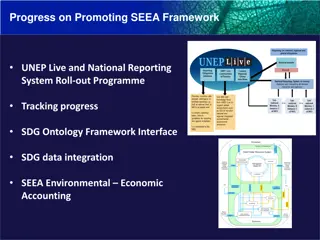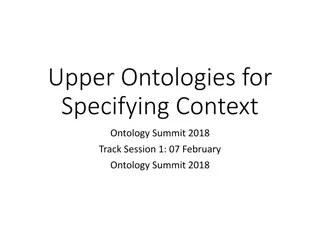Introduction to Meta-analysis in Stata
This workshop, presented by Dr. Christine R. Wells from UCLA, provides an in-depth exploration of meta-analysis in Stata. Participants will learn about systematic reviews, data collection and organization, running meta-analyses, interpreting results, creating graphs, and identifying biases. The focu
5 views • 181 slides
Systematic Reviews, Meta-analysis, and Clinical Practice Guidelines
Explore the importance of systematic reviews, critical appraisal questions, meta-analysis, and clinical practice guidelines in the healthcare field. Learn about the process of appraising systematic reviews, the significance of meta-analysis, and the benefits of following clinical practice guidelines
2 views • 16 slides
Comprehensive Overview of Admetan: A New Meta-Analysis Command
This meta-analysis command, Admetan, introduced by David Fisher from MRC Clinical Trials Unit at UCL, offers a comprehensive analysis of combining results from independent studies. It builds on the history of meta-analysis in Stata and aims to enhance capabilities for researchers. Admetan provides f
1 views • 19 slides
Meta-Analysis in GWAS: Methods and Applications
Meta-analysis in GWAS involves combining data across studies to estimate overall effects, explore cohort differences, improve power, and replicate findings. It includes joint vs. meta-analysis, methods, and types such as fixed effect and random effect meta-analyses.
0 views • 20 slides
Meta's Role in Amplifying Anti-Rohingya Hate on Facebook
The investigation findings reveal Meta's failure to address hate speech and incitement against the Rohingya people on Facebook, resulting in a platform that amplified and promoted harmful content. Despite admitting in 2018 that more needed to be done, Meta's business model of data collection and eng
4 views • 7 slides
WEB-SOBA: Ontology Building for Aspect-Based Sentiment Classification
This study introduces WEB-SOBA, a method for semi-automatically building ontologies using word embeddings for aspect-based sentiment analysis. With the growing importance of online reviews, the focus is on sentiment mining to extract insights from consumer feedback. The motivation behind the researc
2 views • 35 slides
Semi-Automatic Ontology Building for Aspect-Based Sentiment Classification
Growing importance of online reviews highlights the need for automation in sentiment mining. Aspect-Based Sentiment Analysis (ABSA) focuses on detecting sentiments expressed in product reviews, with a specific emphasis on sentence-level analysis. The proposed approach, Deep Contextual Word Embedding
0 views • 34 slides
Meta-programming in Haskell: A Closer Look at Splices and Quotations
Explore the world of meta-programming in Haskell through splices and quotations. Learn about successful extensions introduced by Simon Peyton Jones and Tim Sheard, including practical examples like generating source code using splices that are type-checked and compiled at compile time. Dive into con
3 views • 45 slides
Framework for Ontology Learning from Big Data with IDRA
IDRA (Inductive Deductive Reasoning Architecture) presents a comprehensive framework for ontology learning, focusing on data modeling and architecture components. ETL (Extract Transform Load) processes play a vital role in semantic enhancement of data, especially in identity and access governance co
0 views • 25 slides
Importance of Ontology in System Development for DoT
Ontology plays a crucial role in the development of systems for DoT by facilitating the automation of tasks, improving consistency, and enhancing the efficiency of tool chains. It enables the transformation of semantic descriptions into algorithms, streamlining processes and reducing the need for ma
1 views • 7 slides
Prediction and Confidence Intervals in Meta-Analysis
Conceptually, I-squared represents the proportion of total variation due to true differences between studies, while Proportion of total variance is due to random effects. Prediction intervals provide a range where study outcomes are expected, unlike confidence intervals which contain the parameter's
1 views • 26 slides
Using Word Embeddings for Ontology-Driven Aspect-Based Sentiment Analysis
Motivated by the increasing number of online product reviews, this research explores automation in sentiment mining through Aspect-Based Sentiment Analysis (ABSA). The focus is on sentiment detection for aspects at the review level, using a hybrid approach that combines ontology-based reasoning and
1 views • 26 slides
BabyDayOut Ontology: Describing Picture with Classes, Instances, and Relations
Ontology "BabyDayOut" is developed using RDF/RDFS to describe a picture. It includes classes such as Person, Animal, Baby, Picture, Man, and Gorilla with instances like John, KingKong, Jack, Peter, and Alex. Various relations like hasFriend, hasAnimalFriend, sonOf, depicts, hasEnemy, and hasTitle ar
0 views • 9 slides
SASOBUS: Semi-Automatic Sentiment Domain Ontology Building Using Synsets
Building on the need for automation due to the increasing volume and significance of online reviews, SASOBUS focuses on Aspect-Based Sentiment Analysis (ABSA). The motivation behind SASOBUS lies in the growth of sentiment mining for product reviews, particularly at the sentence level. Its approach i
1 views • 36 slides
Contexts: A Meta-Ontological Approach
Ontologies provide a general representation of reality, but knowledge is mostly context-dependent. Analyzing different types of contexts, from linguistic to manufacturing, remains a challenge. This study aims to deepen the understanding of the ontological nature of contexts by leveraging a meta-onto
0 views • 14 slides
Web Ontology Language (OWL) in a Nutshell
Web Ontology Language (OWL) is a powerful tool for ontology modeling, allowing the creation of complex structures and relationships. OWL encompasses entities, expressions, and properties, enabling detailed descriptions of domains through axioms. The language supports both object and data properties,
1 views • 39 slides
Introduction to Developing OWL Ontologies with Protégé 4
Explore the world of developing OWL ontologies with Protégé 4 through a comprehensive tutorial by Simon Jupp and Timothy Redmond from Stanford Centre for Biomedical Research and the University of Manchester. Learn about OWL introduction, Protégé 4 interface, compositional approach, and the signi
1 views • 44 slides
Introduction to Ontology in Computer Science
Ontology is the study of existence, with applications in various fields like philosophy, linguistics, and computer science. In computer science, an ontology is an engineering artifact that defines a specific vocabulary to describe a domain, along with explicit assumptions about the vocabulary's inte
0 views • 33 slides
Ontology Quiz: Test Your Knowledge on Computational Logic and Philosophy
Delve into the world of ontology with this quiz featuring questions on computational complexity, mereology, standardization of OWL, and foundational ontologies. Test your understanding on topics such as first-order predicate logic, parthood in mereology, and more. Challenge yourself and expand your
1 views • 45 slides
Developing Essential Meta-Skills for Personal Growth
Enhancing meta-skills such as focusing, initiative, integrity, adapting, collaborating, leading, communicating, and feeling is crucial for personal development. These skills enable individuals to maintain concentration, make confident decisions, uphold ethical values, embrace change, build relations
0 views • 14 slides
Bayesian Meta-Prior Learning Using Empirical Bayes: A Framework for Sequential Decision Making Under Uncertainty
Explore the innovative framework proposed by Sareh Nabi at the University of Washington for Bayesian meta-prior learning using empirical Bayes. The framework aims to optimize ad layout and classification problems efficiently by decoupling learning rates of model parameters. Learn about the Multi-Arm
1 views • 27 slides
Visualizing Ontology Evolution for Improved Knowledge Management
Ontologies are dynamic entities that evolve over time, impacting semantically-enabled applications and knowledge acquisition. This work focuses on identifying desired functionalities for ontology evolution systems, highlighting the steps involved in ontology evolution, and emphasizing the importance
0 views • 16 slides
Semantic Tool for Personal Information Protection
Semantic Tool for the Protection of Personal Information Act is a project led by Yahlieel Jafta, aiming to establish a knowledge base using ontology to assist individuals and organizations in interpreting the Act. The project focuses on the importance of ontologies in extending knowledge and enablin
0 views • 17 slides
Comprehensive Guide to Ontology Editors and IDEs for Ontologies
Explore a wide range of Ontology Editors and Integrated Development Environments (IDEs) for managing ontologies efficiently. From simple text editors to advanced IDEs like Protégé and Web Protege, learn about various tools and syntax options available. Dive into Ontology Editors like Protégé 4.3
0 views • 16 slides
Intelligent Ontology Alignment Tool for Complex Mismatches
Dealing with ontology mismatches is crucial in aligning diverse healthcare entities and data sources. Learn about an intelligent ontology alignment tool presented at the ICCS/NTUA workshop in December 2014 in Berlin, focusing on managing conceptual, explication, and classification mismatches using m
0 views • 18 slides
Reproduction of Meta Reinforcement Learning for Optimal Design of Legged Robots
Our project aims to reproduce the Meta Reinforcement Learning process for optimal design of legged robots, focusing on understanding robot design parameters, algorithms, and optimization. We will explore Markov Decision Process (MDP), Model-Agnostic Meta-Learning (MAML), and design optimization tech
0 views • 9 slides
Introduction to Ontology
The evolution of ontology from Carnap's logical positivism to Quine's revival of metaphysics, reshaping the landscape of analytic philosophy. Quine's method for serious ontology challenges traditional views on existence, incorporating scientific theory and logical analysis to explore the nature of r
0 views • 16 slides
Ontology Editor and OWL Syntax Exploration
Delve into the world of ontology editing and OWL syntax with the Protégé Ontology Editor, along with essential reading materials for building OWL ontologies. Discover tools for integrating reasoning and ensuring consistency in your ontologies. Learn about Manchester DL syntax and its user-friendly
0 views • 7 slides
Ontology-Driven Sentiment Analysis for Product and Service Aspects
Sentiment analysis through ontology to determine positive, negative, or neutral sentiments for different aspects of entities. Utilizing ontology for sentiment inference yields explainable results but requires a comprehensive ontology. The purpose is to link lexicalizations to aspect and sentiment co
0 views • 24 slides
SynSemClass - an Event-type Ontology in Multiple Languages
An innovative study on an event-type ontology presented in multiple languages by Zdeka Ureov at Charles University, Prague. This research originates from the Institute of Formal and Applied Linguistics within the Computer Science School. The paper delves into the classification of events with lingui
0 views • 16 slides
Approaches for Federated Query Systems and Ontology Mapping
This content delves into the methodologies, tools, and strategies involved in federated query systems, specifically focusing on ontology mapping, query construction, and types of queries within the i2b2 Star Schema. It discusses the necessity of integrating local codes into central hierarchies and p
0 views • 26 slides
Integrating Ontology Debugging and Matching into Methodology
Most ontology engineering methodologies lack detailed quality assurance steps, leading to issues in ontologies. Ontology Design Patterns can help reduce quality issues in the design stage. eXtreme Design (XD) is a methodology based on ODPs, but additional solutions like ontology matching and debuggi
0 views • 18 slides
Ontology-Based Argument Mining and Automatic Essay Scoring
This research explores the use of ontology-based argument mining and automatic essay scoring to enhance the evaluation process for argumentative essays. By leveraging diagram ontology elements and rule-based algorithms, the system can identify key components like claims, hypotheses, supports, and op
0 views • 17 slides
Introduction to Ontology and IDEs for Ontologies
Ontology is a detailed study of the nature of existence or reality, often represented in structured formats for various applications. Explore different Integrated Development Environments (IDEs) tailored for working with ontologies, from simple text editors to more advanced tools like Protégé and
0 views • 53 slides
Meta-analysis Workshop by Michael T. Brannick - University of South Florida 2016
Explore the meta-analysis workshop conducted by Michael T. Brannick at the University of South Florida in 2016. The workshop covers datasets, open software, steps in meta-analysis, research questions, pros and cons of meta-analysis, and focuses on the research question related to exercise as a treat
0 views • 49 slides
Anatomy Track in Ontology Alignment Evaluation Initiative
Explore experiences and insights from the Anatomy track in the Ontology Alignment Evaluation Initiative, focusing on overlapping ontologies, data integration, agent communication, and bottom-up ontology development for improved alignment. Learn about the initiative's goals, evaluation methods, parti
0 views • 37 slides
Progress on Promoting SEEA Framework and SDG Ontology Integration
Explore the progress made in promoting the System of Environmental-Economic Accounting (SEEA) framework and integrating it with the Sustainable Development Goals (SDG) Ontology. This program tracks advancements in environmental-economic accounting, data flows, ecosystem impacts, and more to enhance
0 views • 4 slides
Understanding Meta-Analysis in GWAS: Methods and Applications
Explore the world of Meta-Analysis in Genome-Wide Association Studies (GWAS) through topics like combining data across studies, joint vs. meta-analysis, and types of meta-analysis. Dive deep into fixed and random effect models, how meta-analysis is used in GWAS, and its significance in estimating ov
0 views • 23 slides
Ontology Summit 2018: Upper Ontologies for Specifying Context Track Session
Explore the objective of the Ontology Summit 2018 track focusing on upper ontologies for context specification. Delve into the role of upper ontologies in defining context and understanding context partitions, all within the realm of ontology usage. Discover the significance of formalizing meaning w
0 views • 18 slides
Ontology Editors, IDEs, and Syntax: Tools for Effective Ontology Development
Explore ontology editors, Integrated Development Environments (IDEs), and syntax options for efficient ontology creation, such as Protege, Web Protege, Manchester OWL Syntax, and data values and datatypes. Learn about popular tools, features, and best practices for managing ontologies effectively.
0 views • 16 slides

